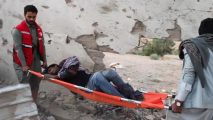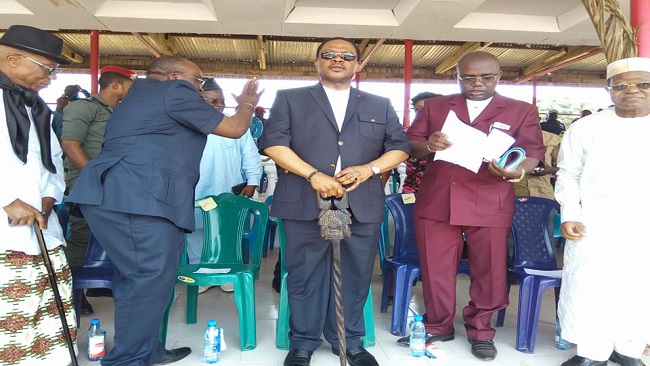Categories
Recent Posts
- Football: Dembele goal gives PSG narrow advantage over Arsenal in Champions League
- US: Trump addressing rally in Michigan as he marks 100 days in office
- Vatican: Conclave to elect new pope will start on May 7
- Namibian minister sacked after being accused of rape
- Dozens of African migrants killed in US strike on Yemen
Archives
- April 2025
- March 2025
- February 2025
- January 2025
- December 2024
- November 2024
- October 2024
- September 2024
- August 2024
- July 2024
- June 2024
- May 2024
- April 2024
- March 2024
- February 2024
- January 2024
- December 2023
- November 2023
- October 2023
- September 2023
- August 2023
- July 2023
- June 2023
- May 2023
- April 2023
- March 2023
- February 2023
- January 2023
- December 2022
- November 2022
- October 2022
- September 2022
- August 2022
- July 2022
- June 2022
- May 2022
- April 2022
- March 2022
- February 2022
- January 2022
- December 2021
- November 2021
- October 2021
- September 2021
- August 2021
- July 2021
- June 2021
- May 2021
- April 2021
- March 2021
- February 2021
- January 2021
- December 2020
- November 2020
- October 2020
- September 2020
- August 2020
- July 2020
- June 2020
- May 2020
- April 2020
- March 2020
- February 2020
- January 2020
- December 2019
- November 2019
- October 2019
- September 2019
- August 2019
- July 2019
- June 2019
- May 2019
- April 2019
- March 2019
- February 2019
- January 2019
- December 2018
- November 2018
- October 2018
- September 2018
- August 2018
- July 2018
- June 2018
- May 2018
- April 2018
- March 2018
- February 2018
- January 2018
- December 2017
- November 2017
- October 2017
- September 2017
- August 2017
- July 2017
- June 2017
- May 2017
- April 2017
- March 2017
- February 2017
- January 2017
- December 2016
- November 2016
- October 2016
- September 2016
- August 2016
- July 2016
- June 2016
Featured
Most Commented Posts
 4 Anglophone detainees killed in Yaounde
4 Anglophone detainees killed in Yaounde
18 comments Chantal Biya says she will return to Cameroon if General Ivo Yenwo, Martin Belinga Eboutou and Ferdinand Ngoh Ngoh are sacked
Chantal Biya says she will return to Cameroon if General Ivo Yenwo, Martin Belinga Eboutou and Ferdinand Ngoh Ngoh are sacked
13 comments The Anglophone Problem – When Facts don’t Lie
The Anglophone Problem – When Facts don’t Lie
12 comments Anglophone Nationalism: Barrister Eyambe says “hidden plans are at work”
Anglophone Nationalism: Barrister Eyambe says “hidden plans are at work”
12 comments Largest wave of arrest by BIR in Bamenda
Largest wave of arrest by BIR in Bamenda
10 comments
Latest Tweets
Featured
-

Football: Dembele goal gives PSG narrow advantage over Arsenal in Champions League
-

US: Trump addressing rally in Michigan as he marks 100 days in office
-

Vatican: Conclave to elect new pope will start on May 7
-

Namibian minister sacked after being accused of rape
-

Dozens of African migrants killed in US strike on Yemen
-

Manyu Division: A new path is possible
-

Who will be the next pope? Key candidates in an unpredictable process
© Cameroon Concord News 2025





8, December 2021
Bishops condemn attacks on Southern Cameroons schools as more details emerge on the Ekondo Titi incident 0
Cameroon’s English-speaking bishops have condemned attacks on schools in the country’s conflict-ridden North West and South West Regions.
Their latest statement comes after four students and a teacher were killed on Nov. 24 at Government Bilingual High School Ekondo-Titi in the South West region.
Schools have become a battleground as Anglophone separatists fight the majority French-speaking government in the African country. For many years, the separatists imposed a schools’ boycott, which they enforced with violence.
“Our hearts have been pierced again!” said Archbishop Andrew Nkea Fuanya of Bamemda, in a statement he signed on behalf of all the bishops of his ecclesiastical province, which overs the Anglophone regions of Cameroon.
“In recent times, we have painfully witnessed an agonizing drama involving, among other evils, the targeting and killing of pupils, students and teachers … We have hardly recovered from the cruel killing of Enondiale Tchuengia Carolaisse, killed in Molyko-Buea on Thursday, October 14, 2021, and the brutal killing of another pupil, Brandy Tataw, on Friday, November 1, 2021, in Nkwen-Bamenda, then we are confronted again with the killing of four more innocent Cameroonians within the protected area of a school,” said the archbishop.
“These innocent victims are not the cause of the socio-political crisis, and their deaths cannot be the solution. Their murder is totally senseless and unacceptable,” Nkea said.
A local government administrator confirmed the attack, telling Crux that “separatist fighters laid ambush in the school before students arrived. They were dressed like soldiers to give students the feeling that they were actual soldiers guarding the school.”
Timothee Aboloa identified the students as Emmanuel Orume 12, Joyceline Iken 16, and Kum Emmanuel, 17. The teacher, Celestine Song was 58 years old and a mother of four.
“It was quite a frightening scene,” said Henry Agbor, a local resident.
“I heard a loud explosive. I was standing around the Okada beach park ready to take a bike to the beach before the mayhem broke out. Besides the teacher and students who have died, many students are also wounded,” he told Crux.
“We never expected this,” said Father Gaetan Ndongo.
“The attacks are creating fear around the place and the education of our children has been systematically sacrificed,” he told Crux.
The recent attacks are a grim reminder of the price education has had to pay in the separatist war in Cameroon’s English-speaking regions, now in its 5th year.
The darkest date was probably Oct. 24, 2020, when six children were killed by suspected separatists at the Mother Francisca International Bilingual Academy in Kumba.
Several other schools were attacked the following month, leading to the deaths of at least three other students.
Earlier this year, on Oct. 14, a soldier killed Enondiale Carolise, a student on her way to school in Buea. Another girl, Tataw Brandy, was killed by a soldier in Bamenda on Nov. 10.
The United Nations says more than 700,000 children have been forced out of school during the conflict, with 2 out of 3 schools being shut.
Yasmine Sherif, the director of Education Cannot Wait, said the Cameroon crisis is among “the most complex humanitarian crises in the world today.”
“Children and youth are having to flee their homes and schools, are threatened with violence and kidnapping, and being forced into early childhood marriage and recruited into armed groups,” said Sherif.
“We call for urgent support from donors to respond to this forgotten crisis. We call for the respect of human rights and adherence to the principles of international humanitarian law and the Safe Schools Declaration, and for partners to redouble efforts so all children and adolescents can get back to the safety, protection and hope that quality learning environments provide,” she said.
The bishops have condemned violence as a means of problem solving, insisting that life must be protected.
“We, the Bishops of the Ecclesiastical Province of Bamenda, condemn these barbaric acts, which violate all International Laws and Conventions safeguarding the inviolability of schools and the protection of learners (pupils and students), and teachers, offend against the fundamental right to education, and breaks the Fifth Commandment of God,” the statement reads.
“We have been persistent in our call for the respect and defence of human rights, especially the right to life, openness to dialogue, an option for the truth and recourse to peaceful means as the best way to a durable solution,” it continues.
While calling on the government to ensure the security of schools, we make a special appeal, once more, to all perpetrators of violence to allow the genuinely human feelings of love, pardon and benevolence to flow into their hearts so that the safety and security of all may be guaranteed, alongside the right of all young people to life and to an education and a future,” the statement added.
Source: Crux